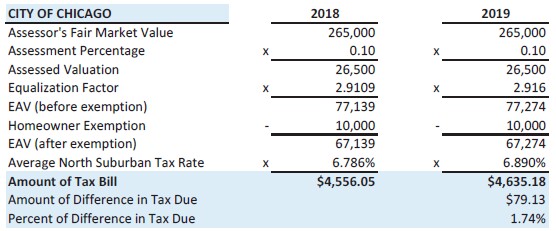In late June Cook County released their 2019 property tax rates that are used to determine tax bills. By now you’ve probably already seen your own property tax bill if you live in Cook County. Nevertheless, each year at this time I like to distill the tax rate report that I just linked to down to a few simple concepts. This really helps our buyers evaluate the potential tax consequences of a purchase because, as I’ll explain later, you can’t just look at what a property’s tax bill has been.
Let me give you a quick overview of how property taxes work in Cook County. First of all, they are not constrained. The county can charge whatever they want and they do charge whatever they need. They start with their budget and then spread that out across all the residential and commercial properties in the county based upon what they think the properties are worth. The only thing that prevents the county from raising taxes to astronomical levels is fear of pitchforks and torches.
This methodology also means that increasing or decreasing aggregate property values has absolutely no impact on how much money the county collects. If values go down they just raise the tax rate. That’s how some of the southern suburbs end up in a death spiral. Their property values go down and their tax rates go up and when the rates go high enough that depresses property values even further.
So what happened in 2019? Surprisingly (that’s sarcasm), Cook County is collecting more property taxes for 2019 than 2018 – $616 MM more, which is a 4.1% increase. However, if you look at the table below (you can right click on it to see a larger version) you’ll see that on average residential property taxes didn’t go up by enough to cover that 4.1% increase. Where did the difference come from? You may have heard that commercial property owners have been screaming about their tax bills. They went up by a lot more to cover the difference and it had to do with increases in their assessed values. Fritz Kaegi is working overtime to repent for the sins of Joe Berrios.
The tax rate report goes on to show a sample tax calculation for the city of Chicago using the average estimated fair market value. It makes you realize just how convoluted the calculation is but I like to simplify it. If you take all those factors and percentages and multiply them together you see that basically it pretty much comes out to an even 2%, which is about where it’s been running the last couple of years. But then you have to back out the effect of the homeowner’s exemption which is $10,000 x 6.89% = $689. In other words, your tax bill should be 2% of your estimated market value – $689.
This simplified tax calculation is easier to remember and comes in handy when shopping for a home. People sometimes get mesmerized by a home that has really low property taxes or scared by one with really high property taxes. However, I always tell folks that any deviation from the norm must be the result of a bad market value estimate. Once the county knows what you actually paid for the home the market value is going to be raised if it was low and if it’s too high you can appeal it using your closing statement. So I tell folks that they should ignore the property taxes shown in the MLS (well, not entirely ignore) and assume that in the long run their property taxes will be – and these are the numbers I will be using for the next year – 2% of the purchase price – $689.
Of course, that tax rate is going to have to change in the long run. Guess which direction. But that’s all we have to work with for now so I run with it. If you want you could always assume some annual growth rate too. But then you might just decide not buy in Chicago.
#PropertyTaxes #ChicagoTaxes
Gary Lucido is the President of Lucid Realty, the Chicago area’s full service real estate brokerage that offers home buyer rebates and discount commissions. If you want to keep up to date on the Chicago real estate market or get an insider’s view of the seamy underbelly of the real estate industry you can Subscribe to Getting Real by Email using the form below. Please be sure to verify your email address when you receive the verification notice.

